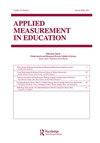中学数学三个学习过程的形成性评价
IF 1.1
4区 教育学
Q3 EDUCATION & EDUCATIONAL RESEARCH
引用次数: 0
摘要
摘要建立在学习进步理论基础上的评估是支持学习和教学的有前途的形成性工具。这些评估的质量和有用性在很大程度上取决于从评估结果中得出的关于学生学习的理论推断的有效性。在这项研究中,我们引入了一种方法来解决一个重要的挑战,该挑战与检查进步之间的理论水平联系有关。我们采用该方法分析了中学数学中三个学习进度的反应数据:等式与变量、函数与线性函数以及比例推理。多维项目反应理论模型适用于数据,以评估假设的学习水平和水平联系。我们的研究结果支持了函数和线性函数以及比例推理的理论假设。因此,测量这些进步的项目可以用于制定形成性评估任务,并有助于教学实践。我们的研究结果并不支持平等和变量的理论基础。讨论了对评估开发人员和用户的影响,以及未来的研究方向。本文章由计算机程序翻译,如有差异,请以英文原文为准。
Examining Three Learning Progressions in Middle-school Mathematics for Formative Assessment
ABSTRACT Assessments built on a theory of learning progressions are promising formative tools to support learning and teaching. The quality and usefulness of those assessments depend, in large part, on the validity of the theory-informed inferences about student learning made from the assessment results. In this study, we introduced an approach to address an important challenge related to examining theorized level links across progressions. We adopted the method to analyze response data for three learning progressions: Equality and Variable, Functions and Linear Functions, and Proportional Reasoning in middle-school mathematics . Multidimensional item response theory models were fit to the data to evaluate the postulated learning levels and level links. Our findings supported the theoretical hypotheses for Functions and Linear Functions, and Proportional Reasoning. Thus, items measuring these progressions can be used to develop formative assessment tasks, and assist instructional practices. Our findings did not support the theory underlying Equality and Variable. Implications for assessment developers and users, and future directions for research were discussed.
求助全文
通过发布文献求助,成功后即可免费获取论文全文。
去求助
来源期刊

Applied Measurement in Education
Multiple-
CiteScore
2.50
自引率
13.30%
发文量
14
期刊介绍:
Because interaction between the domains of research and application is critical to the evaluation and improvement of new educational measurement practices, Applied Measurement in Education" prime objective is to improve communication between academicians and practitioners. To help bridge the gap between theory and practice, articles in this journal describe original research studies, innovative strategies for solving educational measurement problems, and integrative reviews of current approaches to contemporary measurement issues. Peer Review Policy: All review papers in this journal have undergone editorial screening and peer review.
 求助内容:
求助内容: 应助结果提醒方式:
应助结果提醒方式:


